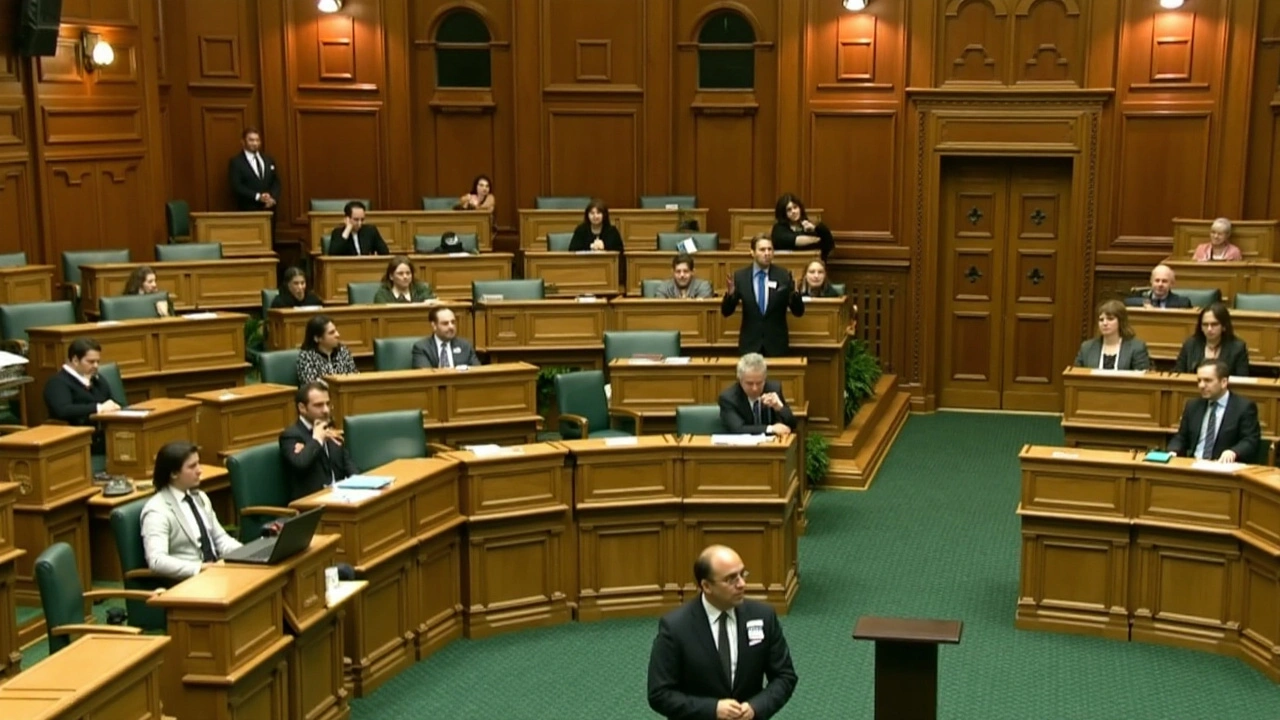Introduction to New Zealand's Tax Compliance Update
New Zealand's Inland Revenue (IR) has taken a significant step in updating its approach to tax compliance for multinational enterprises (MNEs) with the release of the 2024 Multinational Enterprise Compliance Focus document. This move signals a renewed commitment by the tax authority to ensure that multinationals pay their fair share of taxes in the country. The document, which is the first comprehensive update since 2019, lays out a structured strategy geared towards enhancing compliance and addressing areas prone to tax avoidance. As global businesses navigate complex tax landscapes, New Zealand's stance is illustrative of a broader international push for fair taxation.
Key Focus Areas and Innovative Strategies
The IR's document emphasizes a forward-thinking approach, termed 'right from the start,' to underscore the importance of preventing tax discrepancies before they occur. This includes prioritizing high-risk areas where multinationals might attempt to exploit gaps in compliance. To achieve this, the IR plans to harness analytics and intelligence, deploying advanced tools to identify potential infractions promptly. Furthermore, New Zealand continues to leverage global networks for information sharing, a pivotal move in an era where financial activities often transcend borders. This network aids in pinpointing inconsistencies and paves the way for interventions, including thorough reviews and audits when necessary.
A major component of the IR's targeted strategy revolves around Base Erosion and Profit Shifting (BEPS) risks, a global concern that New Zealand is tackling head-on. This can include scenarios where multinationals engage in practices such as high debt levels, which could lead to avoidable interest deductions, or use advantageous loan agreements with associated parties. The use of hybrid instruments and the manipulation of branch arrangements also fall under scrutiny, as they can lead to mismatches and tax base erosion. Equally, the IR keeps vigilant for entities avoiding permanent establishment status or distributing profits inappropriately across branches to minimize their tax burdens.
Incorporating Tax Governance into Strategy
The IR's approach stresses the importance of robust corporate tax governance and actively encourages boards of directors to scrutinize their tax policies comprehensively. The document's inclusion of a self-assessment checklist is a practical tool for MNEs to evaluate their compliance strategies and identify areas for enhancement. This underscores a shift from merely punitive measures to fostering an environment that encourages self-regulation and proactive governance. Nonetheless, lapses in adequately implementing governance procedures could invoke penalties, signifying the gravity of adherence.
New Zealand’s efforts to manage BEPS risk have yielded tangible results. For instance, there has been a noticeable dip in the overall debt levels among multinationals operating within the country, indicating a positive response to regulatory measures. On a fiscal level, MNEs are contributing considerably to the economy, with the IR noting a significant contribution of NZ$6.1 billion to the tax revenue for the 2022/23 period. This is a testament not only to effective tax administration but also to the vital role that multinationals play in the nation's economic framework.
A Pragmatic and Proportionate Approach
In tackling BEPS issues and ensuring compliance, the IR maintains a pragmatic and proportionate stance. This involves acknowledging the complexities added by international tax treaties and agreements like the Mutual Agreement Procedure (MAP), which provide additional layers of complexity when dealing with global corporations. While ensuring that multinationals adhere to local tax laws, the compliance strategy balances the need not to stifle business operations. As the global economy becomes more interconnected, understanding and respecting these nuances are critical.
For multinational companies, the release of this compliance focus serves as a clear message. The IR is not only vigilant and active in pursuing tax compliance but also supportive in helping taxpayers assess their compliance strategies. It is crucial for tax managers and stakeholders to take an introspective view of their current compliance measures, ensuring thorough documentation and comprehensive processes are in place. Addressing the 'Top Ten BEPS risks' and making necessary adjustments can be instrumental in maintaining favorable risk ratings, thereby bolstering corporate reputations and financial integrity.

Conclusion and Call to Action
The unveiling of New Zealand's renewed focus on multinational tax compliance represents a deliberate and necessary response to the evolving challenges within modern tax law enforcement. For businesses, this is a timely reminder to align their operations with the highest standards of tax governance, not only to avoid penalties but to contribute positively to taxation systems on which national economies rely. By fostering transparent and accountable tax practices, MNEs can better integrate into the economic landscape of New Zealand, supporting sustainable growth and adherence to global best practices in taxation.

20 Responses
NZ’s new tax playbook nudges multinationals toward clearer books and bigger contributions
The 2024 compliance focus reads like a drama unfolding on a global stage. New Zealand is stepping into the spotlight, demanding that MNEs play by the rules. It's a bold move that could reshape how tax avoidance is tackled worldwide. The self‑assessment checklist feels like a script for companies to rehearse their part. If they ignore it, the audience – the IR – won’t hesitate to call for an encore of audits.
The document’s emphasis on ‘right from the start’ reflects a formal, preventative stance. By deploying analytics, the IR can spot red flags before they become full‑blown disputes. Multinationals should therefore tighten their governance frameworks promptly. Boards, in particular, must ensure tax policies align with these new expectations. Failure to comply may lead to proportionate penalties.
From a grammatical perspective, the IR’s communication is precise and unambiguous. The terminology surrounding BEPS risks is correctly employed, leaving little room for misinterpretation. However, the prose could benefit from a touch of accessibility for non‑tax professionals. Nonetheless, the clarity aids auditors in pinpointing non‑compliant structures swiftly. It’s a well‑crafted policy notice, albeit a bit dry.
One must admire the diplomatic veneer of the IR’s approach, yet beneath lies a steel‑thread of enforcement. The self‑assessment checklist serves both as guidance and as a subtle threat to the complacent. While the tone is formally courteous, the underlying message is unmistakably assertive: comply or face consequences. The nuanced sarcasm in their phrasing reveals a calculated confidence. In short, they are playing chess, not checkers.
Ever wonder why they keep pushing analytics? It feels like they’re watching every move, like a giant surveillance board. Some say it’s just modern tech, but there’s a whisper of hidden agendas. Still, the data‑driven audits could catch those sneaky loan tricks. Keep an eye out, folks.
Great steps! The checklist is a solid tool for companies to verify their own compliance.
The IR’s new stance is both bold and inevitable; compliance is the new normal.
Awesome update!! 🎉 New Zealand is really stepping up its game on tax fairness!!! 📊 The self‑assessment checklist will make life easier for many, and the analytics push should deter shady structures. Keep it up!! 🙌
So New Zealand decides to be the tax‑policy watchdog, huh? Brilliant, if you enjoy a bit of regulatory drama. Their 'right from the start' mantra sounds reassuring, but it also means companies will be under a microscope from day one. It’ll be interesting to see how multinationals adjust their structures. I suspect a few will find creative loopholes, as always.
Finally, a real tax crackdown.
The move feels like a fresh breeze across the tax landscape, brightening the path for transparent business.
Respectfully, this should push firms to tidy up their books without making the whole process a nightmare.
From a governance perspective, the IR’s checklist is a game‑changer-think of it as a KPI for tax integrity. Companies that hit those metrics will likely see smoother audit pathways and stronger stakeholder confidence. On the flip side, non‑compliance could trigger reputational hits that are hard to shake. Let’s hope the rollout includes clear guidance to avoid confusion. The jargon‑heavy language might need simplification for broader adoption.
While the IR’s intentions appear noble, the practical impact remains to be seen.
THIS IS EXACTLY WHAT OUR NATIONS NEED-TO STOP GLOBAL ELITES FROM ESCAPING FAIR TAXATION!!! THE IR’S ACTION IS A BOLD STAND AGAINST CORRUPT CORPORATE PRACTICES!!! WE MUST SUPPORT SUCH INITIATIVES AT ALL COSTS!!!
The philosophical underpinnings of tax compliance raise questions about the social contract between corporations and the state. If multinationals view taxes as a civic duty, the IR’s proactive stance could reinforce that moral imperative. Conversely, heavy enforcement may breed resentment if perceived as punitive. It’s a delicate balance that warrants ongoing dialogue. In any case, the New Zealand model offers a valuable case study for global tax policy.
Given the formal nature of the IR’s documentation, it is appropriate that the language remains precise and exhaustive. The inclusion of analytical tools demonstrates a commitment to evidence‑based enforcement. Nonetheless, companies should remain vigilant in aligning their internal controls with the stipulated guidelines. Continuous monitoring will be essential to avoid inadvertent breaches. A rigorous approach benefits both the tax authority and compliant businesses.
Happy to see a collaborative effort here; the checklist provides a clear roadmap for compliance and helps avoid unnecessary friction.
The 2024 Multinational Enterprise Compliance Focus document issued by Inland Revenue represents a watershed moment in the ongoing battle against base erosion and profit shifting, a phenomenon that has plagued tax jurisdictions worldwide for decades. By explicitly targeting high‑risk mechanisms such as excessive intercompany debt, the IR signals its willingness to confront the most pernicious loopholes that allow multinational enterprises to artificially depress taxable income. Moreover, the incorporation of advanced analytics and intelligence tools underscores a data‑driven approach that moves beyond traditional audit techniques, allowing for real‑time detection of anomalous transactions. This shift is complemented by a renewed emphasis on information sharing within global networks, a strategic move that enhances the ability to trace cross‑border flows and identify inconsistencies that may otherwise slip through the cracks. The document also stresses the importance of robust corporate tax governance; boards are now expected to assume a proactive role, overseeing tax policy and ensuring alignment with the newly articulated compliance criteria. The self‑assessment checklist serves not merely as a procedural instrument but as a catalyst for cultural change within multinational entities, fostering a mindset of self‑regulation rather than reactive compliance. Early indications suggest a tangible impact: debt levels among multinational operations in New Zealand have already shown a measurable decline, reflecting the effectiveness of the IR’s targeted interventions. Fiscal outcomes are equally encouraging, with the IR reporting a contribution of NZ$6.1 billion to the 2022/23 tax revenue-a clear testament to the efficacy of a balanced, proportionate enforcement strategy. Nonetheless, the document acknowledges the complex interplay of international tax treaties and the Mutual Agreement Procedure, cautioning that over‑zealous application could inadvertently stifle legitimate business activities. In this regard, the IR’s pragmatic stance seeks to strike an equilibrium, ensuring compliance without imposing undue burdens on economic growth. Ultimately, the 2024 focus document not only elevates New Zealand’s tax administration to a new level of sophistication but also provides a replicable framework for other jurisdictions grappling with BEPS challenges. It invites multinational corporations to recalibrate their tax strategies, prioritize transparency, and engage constructively with tax authorities, thereby reinforcing the social contract that underpins modern fiscal systems.